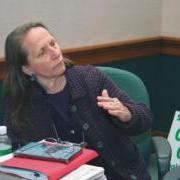 Martha Livingston has been able to list many excellent reasons for a national health care in America since she started working toward the goal almost 20 years ago.
Martha Livingston has been able to list many excellent reasons for a national health care in America since she started working toward the goal almost 20 years ago.
Livingston, a UUP delegate from SUNY Old Westbury, has succeeded in putting 10 of those reasons in print. She co-edited and 10 Excellent Reasons for National Health Care, a book that makes a compelling case for creating a U.S. single-payer health system. She also wrote the book’s first chapter.
“It’s a series of essays on why national health care is so important, but told from many different perspectives,” said Livingston, an associate professor of health and society at Old Westbury. “There’s a labor perspective, we’ve got the health and economic arguments and, finally, the moral argument. This is a matter of simple humanity.”
The 158-page paperback was published in September 2008 by The New Press, an independent, not-for-profit publisher with titles on women’s issues, human rights, social issues, labor and education reform. The book is in its third printing.
Reasons came about after The New Press publisher Ellen Adler approached Livingston and Dr. Mary O’Brien— who co-edited the book with Livingston— at a national health workshop in 2007. Livingston and O’Brien are on the board of directors of the New York Metro Chapter of Physicians for a National Health Program. They finished in early 2008.
“We want Americans to understand this issue and that’s why we did this book,” Livingston said. “We wanted to demystify the issue and we want to get people involved.”
The book’s Forward is written by U.S. Rep. John Conyers (D-Michigan), who introduced The United States National Health Insurance Act (H.R. 676). The American Federation of Teachers endorsed the bill last year.
Livingston’s chapter is titled “It’s good for our health.” It deals with the importance of having accessible health care available when it’s needed—and how that’s not the case for millions of Americans every day.
“How can it be that we spend more on health care in the U.S. than anywhere on the planet and we deny health care to people who need it?,” said Livingston. “We can’t afford not to do this now.”
10 Excellent Reasons for National Health Care is available for purchase online through The New Press, at www.thenewpress.com.
— Michael Lisi

